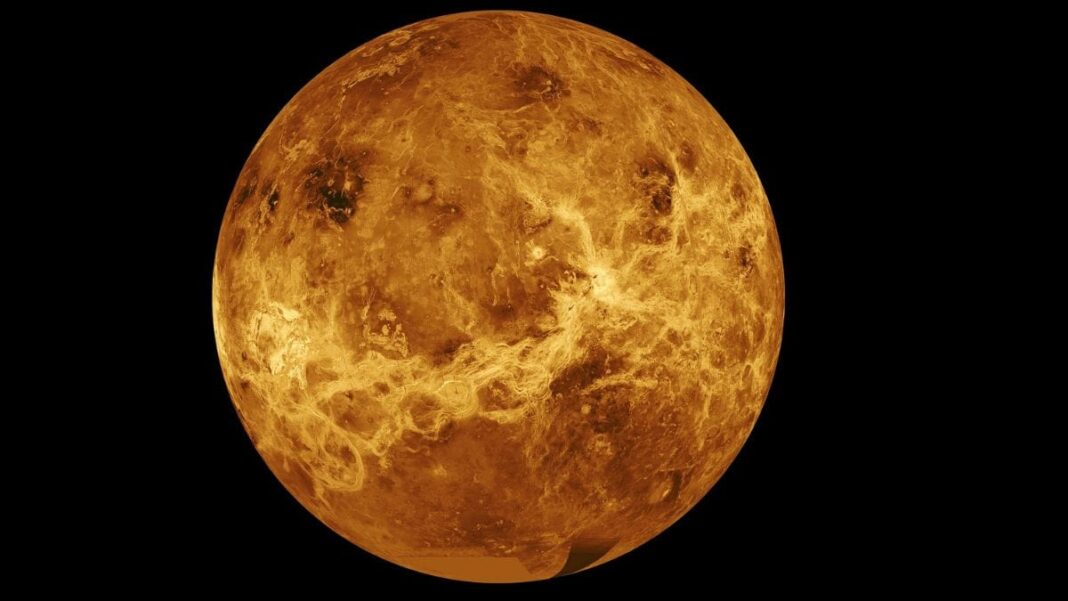Venus: A Dry History Revealed
A recent study published in Nature Astronomy has concluded that Venus likely never had oceans or conditions conducive to life. The research, led by Tereza Constantinou, a doctoral researcher at the University of Cambridge’s Institute of Astronomy, analysed the planet’s atmospheric composition to infer its interior water content. The findings suggest that Venus’s interior is substantially dry, supporting the idea that the planet remained parched throughout its history. These conclusions challenge earlier theories suggesting Venus may have once held liquid water.
Key Indicators of a Dry Interior
As per reports, Venus’s atmospheric chemistry was a focal point of the study. Volcanism on Earth releases gases that are more than 60 percent water vapour, reflecting a water-rich mantle. In contrast, volcanic eruptions on Venus emit gases with no more than 6 percent water vapour. This stark difference indicates a dry interior, suggesting that Venus’s surface conditions were never capable of sustaining liquid water.
In a statement to Reuters, Constantinou explained that the atmospheric chemistry suggests that volcanic eruptions on Venus release very little water, implying that the planet’s interior—the source of volcanism—is equally dry.
Diverging Evolution of Sister Planets
Venus and Earth share many physical similarities, including size and composition. However, their evolutionary trajectories have diverged significantly. As per sources, Venus experiences extreme surface temperatures of approximately 465 degrees Celsius, atmospheric pressure 90 times greater than Earth’s, and sulphuric acid clouds in its toxic atmosphere. Constantinou highlighted these contrasts, stating that such conditions underscore the challenges in studying Venus’s history of habitability.
Future Exploration Plans
Upcoming missions aim to enhance understanding of Venus. NASA’s DAVINCI mission, scheduled for the 2030s, will deploy a descent probe to analyse the planet’s atmosphere and surface, as per reports. The European Space Agency’s EnVision mission will use radar mapping to explore Venus’s surface and atmospheric composition.
These findings provide insight into Venus’s inhospitable history, distinguishing it sharply from Mars, which has evidence of ancient oceans and potential subsurface water reservoirs, according to recent studies.
Conclusion
In conclusion, the study led by Tereza Constantinou sheds light on Venus’s dry history, challenging previous assumptions about the planet’s potential for holding liquid water. The upcoming missions by NASA and the European Space Agency promise to deepen our understanding of Venus and its evolution, providing valuable insights into the differences between Venus and Earth.
FAQs
1. What were the key indicators of Venus’s dry interior?
The key indicators of Venus’s dry interior were revealed through the study’s analysis of atmospheric chemistry and volcanic emissions. The low water content in volcanic gases on Venus suggested a parched interior, unlike Earth’s water-rich mantle.
2. How do Venus and Earth’s evolutionary trajectories differ?
Venus and Earth, despite their physical similarities, have evolved differently over time. Venus experiences extreme temperatures, high atmospheric pressure, and toxic conditions, contrasting with Earth’s habitable environment.
3. What upcoming missions aim to explore Venus further?
NASA’s DAVINCI mission and the European Space Agency’s EnVision mission are set to explore Venus in the coming years. These missions will provide valuable data on Venus’s atmosphere, surface, and geological composition.
4. How do the findings about Venus’s dry history compare with Mars?
The findings about Venus’s dry history contrast sharply with Mars, where evidence of ancient oceans and potential subsurface water reservoirs have been discovered. This highlights the diversity of conditions in our solar system.
5. What implications do these findings have for the search for extraterrestrial life?
The findings about Venus’s dry interior and inhospitable conditions contribute to our understanding of habitable environments in the universe. They emphasize the importance of studying diverse planetary conditions in the search for extraterrestrial life.
6. How can the study of Venus’s history benefit future space exploration?
Studying Venus’s history can provide valuable insights into planetary evolution, atmospheric dynamics, and geological processes. This knowledge can inform future space missions and aid in the exploration of other celestial bodies.
7. What role does volcanic activity play in understanding a planet’s interior composition?
Volcanic activity can offer clues about a planet’s interior composition by analyzing the gases released during eruptions. The water content in volcanic gases can indicate the presence of water in a planet’s mantle and provide insights into its history.
8. How do the upcoming missions by NASA and the European Space Agency differ in their approaches to studying Venus?
NASA’s DAVINCI mission will focus on deploying a descent probe to analyze Venus’s atmosphere and surface directly. In contrast, the European Space Agency’s EnVision mission will use radar mapping to explore Venus’s surface and study its geological features.
9. What challenges do researchers face in studying Venus’s history of habitability?
Researchers studying Venus’s history of habitability face challenges due to the planet’s extreme conditions, including high temperatures, atmospheric pressure, and acidic clouds. These factors make it difficult to determine whether Venus was ever capable of supporting life.
10. How do the findings of this study contribute to our understanding of planetary evolution?
The findings of this study deepen our understanding of planetary evolution by highlighting the differences between Venus and Earth. By revealing Venus’s dry history and contrasting it with Mars’s watery past, the study provides valuable insights into the diverse paths planets can take in our solar system.
Tags
Tags: Venus, Astronomy, Planetary Science, NASA, European Space Agency, Evolution, Habitability

